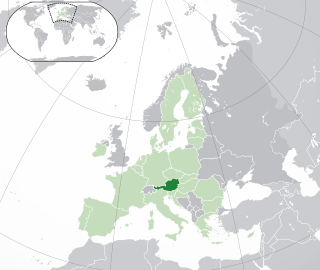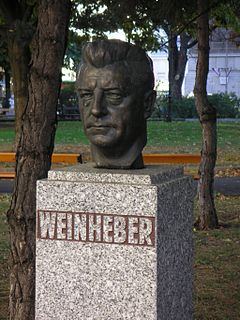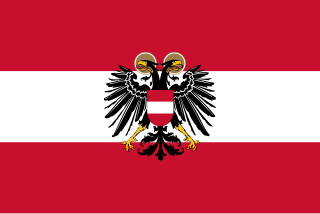Related Research Articles

Salzburg is the capital city of the State of Salzburg and fourth-largest city in Austria. In 2020, it had a population of 156,872.

Karl Lueger was an Austrian politician, mayor of Vienna, and leader and founder of the Austrian Christian Social Party. He is credited with the transformation of the city of Vienna into a modern city. The populist and antisemitic politics of his Christian Social Party are sometimes viewed as a model for Adolf Hitler's Nazism.

Karl August Leopold Böhm was an Austrian conductor. He was best known for his performances of the music of Mozart, Wagner and Richard Strauss.

Robert von Dassanowsky FRHistS, FRSA is an Austrian-American academic, writer, film and cultural historian, and producer. He is usually known as Robert Dassanowsky.

Ostmark was the name used by Nazi propaganda from 1938 to 1942 to replace that of the formerly independent Federal State of Austria after the Anschluss with Nazi Germany. From the Anschluss until 1939, the official name used was Land Österreich.

The Austrian Football Association is the governing body of football in Austria. It organises the football league, Austrian Bundesliga, the Austrian Cup and the Austrian national team, as well as its female equivalent. It is based in the capital, Vienna.

The history of the Jews in Austria probably begins with the exodus of Jews from Judea under Roman occupation. Over the course of many centuries, the political status of the community rose and fell many times: during certain periods, the Jewish community prospered and enjoyed political equality, and during other periods it suffered pogroms, deportations to concentration camps and mass murder, and antisemitism. The Holocaust drastically reduced the Jewish community in Austria and only 8,140 Jews remained in Austria according to the 2001 census, but other estimates place the current figure at 9,000, 15,000 and 20,000 people, if accounting for those of mixed descent.
Sebastian Leitner was a German commentator and science popularizer.

The National Front was a far-right political party in Switzerland that flourished during the 1930s. At its peak the group had as many as 9,000 members, according to the Historical Dictionary of Switzerland, and "may have had a membership of 25,000 or so", according to the Simon Wiesenthal Center.

Werner Johannes Krauss was a German stage and film actor. Krauss dominated the German stage of the early 20th century. However, his participation in the antisemitic propaganda film Jud Süß and his collaboration with the Nazis made him a controversial figure.
The Austrian Red Cross is the national Red Cross Organization in Austria and is part of the International Red Cross and Red Crescent Movement. It was established on March 14, 1880 by Doctor Adam Lichtenheld of the Vienna General Hospital and is the biggest aid agency in the country.

Translated from German Wikipedia
Wilhelm Teuber-Weckersdorf was an Austro-Hungarian officer and a Scouting pioneer in Austria, popularly known within the Scouting movement as "Willy Teuber" or "Onkel Teuber".

The Federal State of Austria was a continuation of the First Austrian Republic between 1934 and 1938 when it was a one-party state led by the clerical fascist Fatherland Front. The Ständestaat concept, derived from the notion of Stände, was advocated by leading regime politicians such as Engelbert Dollfuss and Kurt Schuschnigg. The result was an authoritarian government based on a mix of Italian Fascist and conservative Catholic influences.
Anti-Jewish boycotts are organized boycotts directed against Jewish people to exclude them economical, political or cultural life. Antisemitic boycotts are often regarded as a manifestation of popular antisemitism.
Julius Braunthal (1891–1972) was an Austrian-born Jewish historian, magazine editor, and political activist. Braunthal is best remembered as the Secretary of the Socialist International from 1951 to 1956 and for his massive three volume History of the International, first published in German between 1961 and 1971.

Alfred Jerger was an Austrian operatic bass-baritone, who began his career as a conductor of operettas, and was also an interim director of the Vienna State Opera and a professor of the Vienna Music Academy. He appeared at the Salzburg Festival from 1922 to 1959, and created the leading role of Mandryka in Arabella by Richard Strauss, among others.
Viktor Riemann was an Austrian author, commentator, journalist and politician (VdU). He sat as a member of the "Nationalrat" between 1949 and 1956.
Franz Sauer was an Austrian organist and music educator.
References
- ↑ Der Antisemitenbund. In Reichspost , June 29, 1919, p. 177. See
- 1 2 3 Shapiro, Robert Moses (2003). Why Didn't the Press Shout?: American & International Journalism During the Holocaust. pp. 273–274. ISBN 9780881257755 . Retrieved 2018-06-06.